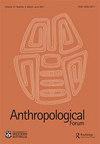Gothic Sovereignty: Street Gangs and Statecraft in Honduras
IF 0.7
3区 社会学
Q3 ANTHROPOLOGY
引用次数: 2
Abstract
behoves him to acknowledge that white people are – like all of us – subject to epistemic blindness that shields options and possibilities from view (Mignolo 2011; Sousanis 2015). Indeed, Ailton observes the concentration of wealth and power means that the revolutionary politics that might have overthrown broken systems in the past ‘no longer makes sense today’ (5). Without questioning the urgent need for change as Ailton describes, there is an absence of acknowledgement that we are trapped, as he himself points out, in a world where it is ‘becoming impossible to orient ourselves toward treading lightly on the Earth’ (49) or resist forces which compel us not to. One might suggest that white people are not ‘horrified’ by the idea of a better world but rather struggle to imagine another world or politics. It is telling in this sense that a key prescription for overcomingWestern ways of thinking is in ‘dreaming’ as an institution; a form of radical imagination that is both experiential and shared – one cannot do this on one’s own. This book is a polemic on the ravages of Western modernity, global capitalism and consumerist delusions. There are passages of truly beautiful writing, especially Ailton’s personal reflections on the profundity of not only his own peoples’ knowledge but Indigenous knowledges globally. The central message of this book is that life is not something to make use of, but rather something beautiful and intricately relational.哥特主权:洪都拉斯街头帮派与治国之道
他应该承认白人——像我们所有人一样——受制于认知盲目性,这种盲目性屏蔽了选择和可能性(Mignolo 2011;Sousanis 2015)。的确,Ailton观察财富和权力的集中意味着革命政治可能推翻破碎系统过去的今天不再是有意义的(5)。没有质疑迫切需要改变Ailton描述,有一个没有承认我们被困,正如他指出的那样,在这个世界上,它是“成为不可能使自己小心地走在地球上”(49)或抵抗力量迫使我们不要。有人可能会说,白人并没有被一个更美好的世界的想法“吓坏”,而是在努力想象另一个世界或政治。从这个意义上说,克服西方思维方式的关键处方是“梦想”成为一种制度;这是一种既具有经验又具有共享性的激进想象——一个人无法独自做到这一点。这本书是对西方现代性的破坏、全球资本主义和消费主义错觉的一场论战。书中有几段文字非常优美,尤其是艾尔顿对自己民族知识的深刻思考,以及对全球土著知识的深刻思考。这本书的中心思想是,生命不是用来利用的东西,而是一种美丽而复杂的关系。
本文章由计算机程序翻译,如有差异,请以英文原文为准。
求助全文
约1分钟内获得全文
求助全文
来源期刊

Anthropological Forum
ANTHROPOLOGY-
CiteScore
3.60
自引率
10.00%
发文量
14
期刊介绍:
Anthropological Forum is a journal of social anthropology and comparative sociology that was founded in 1963 and has a distinguished publication history. The journal provides a forum for both established and innovative approaches to anthropological research. A special section devoted to contributions on applied anthropology appears periodically. The editors are especially keen to publish new approaches based on ethnographic and theoretical work in the journal"s established areas of strength: Australian culture and society, Aboriginal Australia, Southeast Asia and the Pacific.
 求助内容:
求助内容: 应助结果提醒方式:
应助结果提醒方式:


